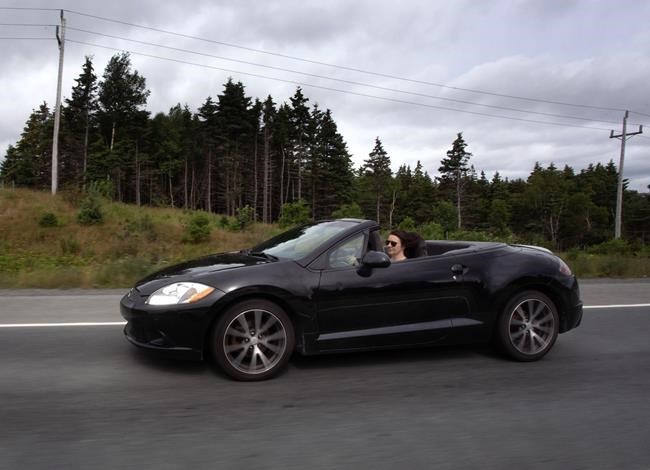When Jennifer Cummings flew down to Florida from St. John’s, N.L., last summer, she opted to arrive in style.
The 41-year-old signed on to a “peer-to-peer” car-sharing site and rented a gleaming white Alfa Romeo SUV — from its private owner.
“I went for the most exotic-looking car that was somewhat in my price range,” Cummings said of the Italian luxury vehicle, which cost her $150 for a 24-hour stint.
“I felt very important driving in Florida to the beaches for the day in this fancy European car.”
Meanwhile, her mom — with her on the Fort Lauderdale trip — wound up renting the exact same car she drives at home. “Could you be more boring?”
Their sunshine getaway happened just months after Cummings became a “host” on Turo, one of several car-share platforms that run on a so-called peer-to-peer model — the same platform she used to rent the Alfa Romeo.
It’s like Airbnb, but for cars.
While the burgeoning sector has seen some companies already bow out, Turo, along with offerings in the works from Communauto and Uber, provide alternatives that can save users money, or at least present more choices as the auto rental market remains tight.
“It's a little bit more customizable. You can pick your drop-off locations, pick where you want to leave it,” said Cummings, who is both a host and — on vacations — a user.
She and her partner went from offering two vehicles to eight in just over a year, including a BMW X1 SUV, Chevrolet Cruze sedan and Mitsubishi Spyder convertible. The per-day price ranges from $99 to $175.
Turo, which launched in Ontario, Quebec and Alberta in 2016, and has since expanded to British Columbia and Atlantic sa╣˙╝╩┤ź├Ż, allows hosts to list their car for free. They pay a 25 per cent commission to the platform to cover insurance as well as marketing, advertising and customer service.
The pricing model positions peer-to-peer as a rival to rental services rather than to hourly car-share outfits such as Zipcar and sa╣˙╝╩┤ź├Ż's Evo.
“It’s kind of more rental than car sharing,” said Marco Viviani, vice-president of strategic development for car-share company Communauto.
“People use it for longer trips or by the day. But frequently you have to go a ways to get the car,” he said. In contrast, standard car-sharing is for “going for groceries, going to .. buy flowers, bringing children to the soccer game.”
Communauto plans to launch a peer-to-peer service in the next couple of years, he said, though there’s no set date.
The operation would serve to build on its membership in the tens of thousands and complement its fleet of 3,500 cars in Montreal, along with 1,500 others across Quebec, Ontario, Alberta, Nova Scotia, and Paris.
Uber also plans to launch a peer-to-peer service later this year in Toronto called Uber Carshare after buying Australia-based car-share network Car Next Door last year.
The new entries come as peer-to-peer popularity seems to be growing.
The number of people who signed up for Turo doubled in sa╣˙╝╩┤ź├Ż in 2022. “We're talking hundreds of thousands of Canadians that have used Turo for their travel needs last year,” said Cedric Mathieu, head of Turo sa╣˙╝╩┤ź├Ż.
“We have lots of Teslas … Guests love to get access to these electric cars to actually drive them to experience them for a few days, and even use the platform almost as an extended test drive opportunity.”
Tens of thousands of hosts have also signed on. The average monthly income is $732, Mathieu said. “That goes a long way in offsetting the high cost of car ownership in sa╣˙╝╩┤ź├Ż.”
A standard insurance plan is available to hosts that protects against damage for collision as well as theft, with $2 million in third-party liability coverage.
“However, if (users) do not purchase additional insurance or use their credit card, as many do, with rental car coverage, they are not covered for the damage to my car,” Cummings noted.
The peer-to-peer business model has been tried before and found wanting, hitting insurance bumps, legal jams and problems of scale. Turo was effectively barred from New York until last year for reasons relating to the state’s insurance laws. Last year the Competition Bureau forced the company to end its policy of preventing a host from also listing the vehicle on other platforms, following an agency investigation.
While hosts must submit proof of maintenance each year, user experiences may vary from rental to rental, with some cars quieter or cleaner than others — even if it's the same model. Reviews offer one way to assess quality.
Moreover, fees for items ranging from car seats to airport charges may inflate the bill.
Also hosts tend to use their cars at the very time when demand is highest, making peer-to-peer less “reliable,” said Viviani at Communauto.
“This is contrary to what happens with Airbnb — when people leave for vacation, they leave their house …. That's why P-to-P platforms frequently have a big number of cars that are registered but a small number of cars that are available.”
Nonetheless, with car rental rates through the convertible roof and many car-sharing companies’ departure now in the rear-view mirror — Car2Go, General Motors’ Maven, Hertz sa╣˙╝╩┤ź├Ż and Uhaul Car Share all shut down or left North America — peer-to-peer offers a less rigid, if less consistent, alternative.
While many may be uncomfortable renting out their personal vehicle, the benefits are obvious, said Cummings. She said she grosses between $70,000 and $80,000 a year — “not including the thousands we spend on maintenance” — mainly from visitors to Newfoundland.
“If you refer to your car as my baby, this is not the place for you,” she said.
This report by The Canadian Press was first published Aug. 3, 2023.
Christopher Reynolds, The Canadian Press



